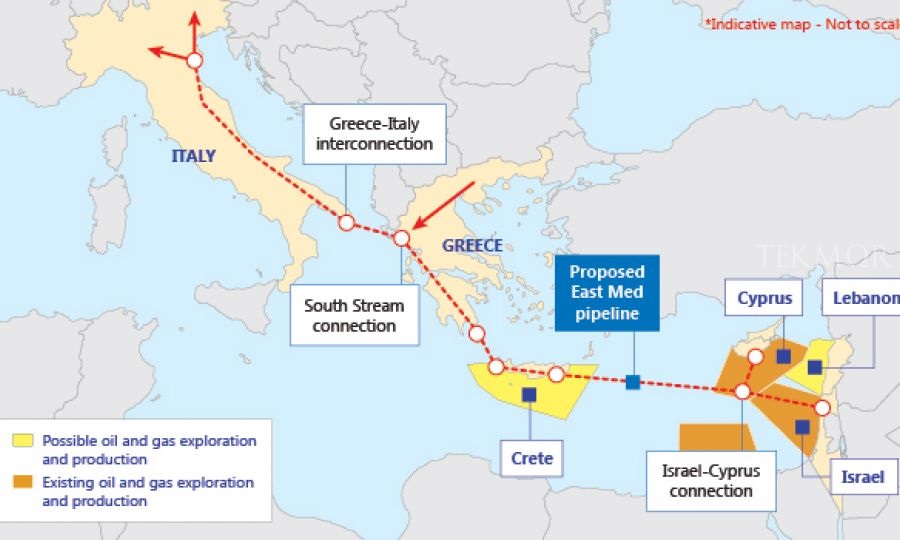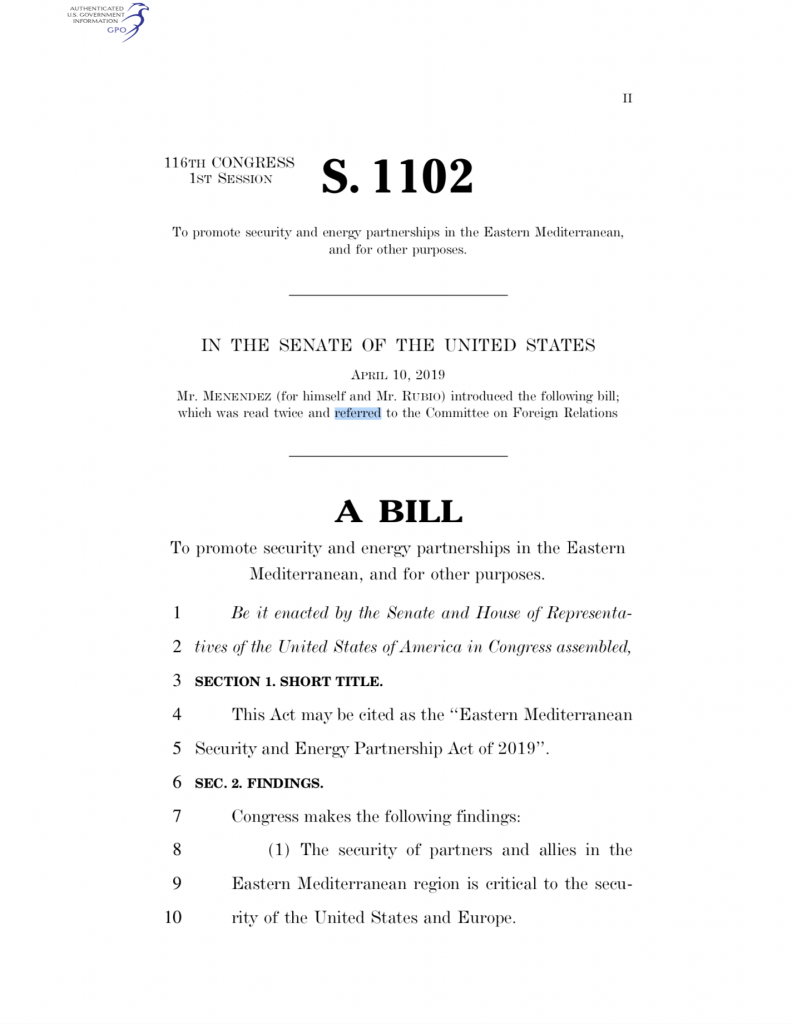
The U.S. Congress is currently working on yet another anti-Russian bill called “Senate Bill S. 1102: Eastern Mediterranean Security and Energy Partnership Act of 2019.’’ Russia is not far away from the Eastern Mediterranean—but the United States is. Nevertheless, Washington’s zealous eye perceives Russian “malign” influence there and intends to radically eliminate it.
The draft law on the Eastern Mediterranean is in fact a road map for curbing Russia’s political, economic and military relations with the states of the region, for replacing Russian gas in Europe with Mediterranean and for militarizing the region against Russia, and Turkey.
The meaning of the initiative is two-fold. In the area of energy, within the framework of President Trump’s strategy of turning the United States into an “energy superpower,” the bill is working on developing new sources of gas for Europe and building pipelines for its delivery in order to displace the Russian gas. In the military sphere, the goal is to strengthen the U.S. position in the region by putting together an alliance with Greece, Cyprus and Israel, along the way striking at Turkey, whose President Erdogan makes excessively independent—and even scandalous for a NATO member—decisions, such as acquiring of the Russian S-400 anti-missile system.
The Eastern Mediterranean project unfolds under Russia’s southern borders in order to cut off Russia’s partners in the south and Middle East, and sharply limit Russia’s actions in these critical regions. Simultaneously, Russia’s western borders are being framed by the Intermarium concept, i.e. creating a cordon in Eastern and Central Europe under Poland’s supervision, thereby separating Russia from Germany and France.

Senate Bill S. 1102 deals a direct blow to Russia, but also to Europe. Stopping the North Stream 2 having been unsuccessful, the United States synchronously approaches from the south to take control of energy flows there and impose its gas prices on Europeans.
The U.S. Senate introduced S. 1102 on April 10, in the spirit of bipartisan consensus, by Florida Republican Marco Rubio and New Jersey Democrat Bob Menendez. The bill arrived in the House of Representatives on May 22 (H.R. 2913) with some additions and is currently being read in five committees and a Subcommittee on Crime, Terrorism, and Homeland Security. Both the House of Representatives and the Senate will return to work on September 9, 2019.
“Russia: Get out of the Mediterranean!”
The scary word “Russia” is in the text no fewer than 25 times. In fact, the bill prohibits Russia from conducting any foreign policy or developing any economic cooperation in the region.
First, the bill aims to oust Russian gas from Europe by capitalizing on new gas fields off the coast of Egypt, Israel and Cyprus, and building pipelines to transport this gas. These include the Trans-Adriatic Pipeline (TAP), the Gas Interconnector Greece-Bulgaria (IGB) pipeline, as well as liquefied natural gas (LNG) terminals, all with the aim to “facilitate delivery of non-Russian gas to the Balkans and Central Europe.” It straightforwardly states: “non-Russian.”

Geopolitical redux
An historical analogy to this project is the Reagan administration plan to oust Soviet gas from Europe in the mid-1980s. This meant Europeans were obligated to develop new fields in Norway and buy more expensive gas, with a “security premium.”
Developing these new gas fields in the Eastern Mediterranean is also useful to the United States in that it will enrich the most loyal American partner in the region: Israel. Cyprus, which according to the bill, is a de facto U.S. colony in the security field—even though some in Russia think of Cyprus as a close partner—will also profit significantly.
Second, it is planned “to support efforts to counter Russian Federation Government interference and influence in the Eastern Mediterranean through increased security cooperation with Greece, Cyprus and Israel, to include intelligence sharing, raising awareness in cyberspace and the sea” (Section 3.9). The bill states that “It is the policy of the United States…to urge countries in the region to deny port services to the Russian Federation vessels deployed to support the government of Bashar al-Assad in Syria” (Section 3.13) and “to support efforts by countries in the region to demobilize military equipment supplied by the Government of the Russian Federation in favor of equipment provided by NATO and NATO-allied member countries” (Section 3.16). The document also calls “to fully implement relevant provisions of the Law on Countering America’s Adversaries through Sanctions (CAATSA) to prevent interference by the Government of the Russian Federation in the affairs of the region” (Section 3.15).
“[The bill]…also calls “to fully implement relevant provisions of the Law on Countering America’s Adversaries through Sanctions (CAATSA) to prevent interference by the Government of the Russian Federation in the affairs of the region.” (Section 3.15)
As a “justification,” the text mandates that “Not later than 90 days after the date of the enactment of this Act, the Secretary of State will submit to the appropriate congressional committees a report on Russian Federation malign influence in Cyprus, Greece, and Israel since January 1, 2017” (Section 11).
The bill’s anti-Russian intention continues as other states are discussed in the bill.
Greece is the new key U.S. ally in the region
Greece is considered one of the European states most disposed toward Russia—this, according to the draft law, is going to change. The plans outlined in the text are clearly working on turning Greece into a new outpost of the U.S. military and energy policy in the Eastern Mediterranean and the Middle East—to replace Turkey, which Washington sees as increasingly unreliable.

Greece has been converted from a source of problems to a source of solutions, U.S. Ambassador Geoffrey Ross Pyatt said on July 17 at The Economist conference, while congratulating the new Greek prime minister, Kyriakos Mitsotakis, and his government on a seamless transition and dedication to Greek-U.S. relations. [Credit: https://defence-point.com/2019/07/17/us-ambassador-to-athens-greece-is-now-a-source-of-solutions/]

The bill is the result of several years of preparatory efforts. Three years ago, in the summer of 2016, the new U.S. ambassador Geoffrey Pyatt arrived in Athens. This name is well known in Russia because of his previous post in Ukraine: It was Ambassador Pyatt who supervised the coup d’état of 2014 and handed out cookies in Kiev’s Maidan Square, along with former Assistant Secretary of State Victoria Nuland. Upon arrival in Greece, Pyatt unleashed his activities as widely as in Ukraine. The country’s young prime minister, center-left Alexis Tsipras, who received the go-ahead from 62% of Greeks for a path to independence in the previous year’s referendum, capitulated to the threats and pressure—perhaps Pyatt promised him a Maidan, as in Ukraine.
As a result, the Tsipras government has agreed to:
- Modernize the U.S. naval base in Souda bay on the island of Crete;
- Create a helicopter base in northern Greece and a drone base near Larissa in central Greece;
- Militarize the island of Karpathos in the eastern Aegean Sea; and
- Build a port for American liquefied natural gas in Alexandroupolis.
Moreover, at a meeting in Washington in October 2017, Tsipras and Trump discussed the transfer of tactical nuclear weapons from the Incirlik air base in Turkey to Andravida in northwestern Peloponnese.
The new bill asserts that “It is the policy of the United States” to “maintain a robust United States naval presence and investments in the naval facility in Souda Bay, Greece and develop deeper security cooperation with the latter to include the recent MQ–9 Reaper (sometimes called Predator B) deployments to the Larissa Air Force base and United States Army helicopter training in central Greece” (Section 3.4).
With the new center-right government of Kyriakos Mitsotakis in power since the July 7 parliamentary elections, Greece’s participation in U.S. and NATO military policy will become even more active. Already in the first week, the new government made a landmark decision: to recognize the impostor Juan Guaidó as Venezuelan president. This is a signal to Washington: “We will follow you.” Another striking merging of security interests is seen in Panagiotis Kontoleon’s appointment as the new director of Greece’s National Intelligence Service. His current role is head of the Greek branch of G4S, the Anglo-American private security company in charge of U.S. embassy security in Athens.
The new alliance in the region: Israel, Greece, Cyprus and the USA
With Greece dissociated from Russia, it will be firmly tied to Israel as America’s authorized curator in the region.
The introductory part of the draft law asserts a “finding” that, according to a joint declaration of March 21, 2019, four states—Greece, Cyprus, Israel, and the United States—agreed to “defend against external malign influences in the Eastern Mediterranean and the broader Middle East….” The main source of “external malign influence” is, naturally, Russia.
As mentioned in the bill, Secretary of State Mike Pompeo—CIA director until March 2018—took part in a trilateral summit between Israel, Greece and Cyprus in Jerusalem on March 20, 2019. Similar summits take place at least annually. In a similar vein, Alexis Tsipras managed to visit Israel three times in four years. None of his predecessors visited Israel so often.

The bill states that the United States intends “to continue to actively participate in the trilateral dialogue on energy, maritime safety, cyber security and protection of critical infrastructure conducted among Israel, Greece and Cyprus” (Section 3.1) and “to support diplomatic efforts with partners and allies to deepen energy security cooperation among Greece, Cyprus and Israel and to encourage the private sector to make investments in energy infrastructure in the Eastern Mediterranean region” (3.2). The United States engages “to support robust International Military Education and Training (IMET) programming with Greece and the Republic of Cyprus “(3.7), as well as joint military exercises among Israel, Greece and Cyprus (3.14) and “to strongly support the active and robust participation of Israel, Cyprus and Greece in the Combating Terrorism Fellowship Program” (3.17).
As is well known, the main “terrorist” for the United States and Israel is Iran, and the struggle against it is unfolding, including in Syria.
These measures will have a concrete consequence: the deployment of Israeli military assets on the territory of Greece will drag Athens into hostile actions against Syria and Iran.
Cyprus: a springboard against Turkey
The proposed legislation assigns Cyprus a significant role not only in the alliance with Israel and Greece, but also independently.
The document recalls that “Cyprus is a key strategic partner and signed a Statement of Intent with the United States on November 6, 2018, to enhance bilateral security cooperation” (Section 2.4). Also, “The United States Government cooperates closely with the Government of the Republic of Cyprus through information sharing agreements” (2.18) and “United States officials have assisted the Government of the Republic of Cyprus with crafting that nation’s national security strategy” (2.19). The U.S. “provides training to Cypriot officials in areas such as cybersecurity, counterterrorism, and explosive ordnance disposal and stockpile management” (2.20). Cyprus, according to the text, will also have to stop purchasing Russian weapons and completely switch to American military equipment.
Additionally, in the House of Representatives version of the bill—in comparison with the Senate bill—there are supplementary requirements for Cyprus, namely, that the country should stop issuing “gold passports” under the Citizenship for Investments program, to citizens of Russia and Ukraine. Cyprus must also “conduct an assessment of the activities of Russia-related structures” for illegal banking operations and improve its banking system in order to prevent such operations. Measures to combat money laundering and capital flight from Russia could be welcomed, if the United States were not pursuing completely different objectives.
However, the bill also looks for more sinister goals. The U.S. is clearly going to militarize Cyprus. Recall that the north of Cyprus was seized by Turkey in 1974, during the ‘Black Colonels’ junta. Currently, there are about 40,000 Turkish soldiers stationed in the north. It will not take much to provoke a conflict with Turkey in Cyprus, which will become another crisis for President Erdogan, whom the United States intends to overthrow by hook or by crook. The situation is heating up now: Greece and Cyprus are protesting sharply against drilling on the shelf of Cyprus started by Turkey.

End goal: U.S. control of the region
The draft law “Eastern Mediterranean Security and Energy Partnership Act of 2019” has serious chances of passing. It continues a series of already adopted laws, such as the “Law on Countering America’s Opponents through Sanctions (CAATSA),” and others being considered including “Defending American Security from Kremlin Aggression Act of 2018 (The Kremlin Act).”
But the key reason for this bill is that it pursues one of the main goals of the Trump administration: to make the United States an “energy superpower.” This ambition is only realizable to the detriment of Russian and wider European interests—all at the cost of growing tensions and possible military conflicts in key regions of the world with energy reserves and transit routes.

The Russian version of this article was published by RIA Novosti on July 19, 2019 at https://ria.ru/20190719/1556655185.html.
CovertAction Magazine is made possible by subscriptions, orders and donations from readers like you.
Blow the Whistle on U.S. Imperialism
Click the whistle and donate
When you donate to CovertAction Magazine, you are supporting investigative journalism. Your contributions go directly to supporting the development, production, editing, and dissemination of the Magazine.
CovertAction Magazine does not receive corporate or government sponsorship. Yet, we hold a steadfast commitment to providing compensation for writers, editorial and technical support. Your support helps facilitate this compensation as well as increase the caliber of this work.
Please make a donation by clicking on the donate logo above and enter the amount and your credit or debit card information.
CovertAction Institute, Inc. (CAI) is a 501(c)(3) non-profit organization and your gift is tax-deductible for federal income purposes. CAI’s tax-exempt ID number is 87-2461683.
We sincerely thank you for your support.
Disclaimer: The contents of this article are the sole responsibility of the author(s). CovertAction Institute, Inc. (CAI), including its Board of Directors (BD), Editorial Board (EB), Advisory Board (AB), staff, volunteers and its projects (including CovertAction Magazine) are not responsible for any inaccurate or incorrect statement in this article. This article also does not necessarily represent the views the BD, the EB, the AB, staff, volunteers, or any members of its projects.
Differing viewpoints: CAM publishes articles with differing viewpoints in an effort to nurture vibrant debate and thoughtful critical analysis. Feel free to comment on the articles in the comment section and/or send your letters to the Editors, which we will publish in the Letters column.
Copyrighted Material: This web site may contain copyrighted material the use of which has not always been specifically authorized by the copyright owner. As a not-for-profit charitable organization incorporated in the State of New York, we are making such material available in an effort to advance the understanding of humanity’s problems and hopefully to help find solutions for those problems. We believe this constitutes a ‘fair use’ of any such copyrighted material as provided for in section 107 of the US Copyright Law. You can read more about ‘fair use’ and US Copyright Law at the Legal Information Institute of Cornell Law School.
Republishing: CovertAction Magazine (CAM) grants permission to cross-post CAM articles on not-for-profit community internet sites as long as the source is acknowledged together with a hyperlink to the original CovertAction Magazine article. Also, kindly let us know at info@CovertActionMagazine.com. For publication of CAM articles in print or other forms including commercial internet sites, contact: info@CovertActionMagazine.com.
By using this site, you agree to these terms above.
About the Author

Veronika Krasheninnikova is a political scientist and foreign policy expert specializing in U.S. and European affairs. She is Director General of the Institute for Foreign Policy Research and Initiatives, www.invissin.ru.
In 2016-2018 Ms. Krasheninnikova hosted a weekly political analysis show on TV channel “Zvezda.” In 2003-2010 she was first Managing Director and then President of the Council for Trade and Economic Cooperation Russia-USA in New York. She is fluent in French and English.












Reading all these news, I understand that out world is going to nowhere. Everybody wants more lands, more power. Nobody cares about people.
I think it is all double the time would be needed for alternative energies exchange; obviously, military contingency will produce amount of needed constriction between nations which depend on military advice about new technology as well with the influx of new energy sources… this is not the problem!
State of technology in 2030 | Future Forecast
The algorithms have to be reliant upon quantum techno-advances by a total time-rate in energy production, usage and integrity; this integrity will become the context sub-atomic and sub-nuclear… The foundations of all scientific research, holofractal computation is reliant upon… new energy scale.
Like Life Itself: Sustainable Development is Fractal (7 January 2011)
Israel, Greece and Cyprus: these should be centralized with new scale energy contingent core activities and transit!
4:43 PM